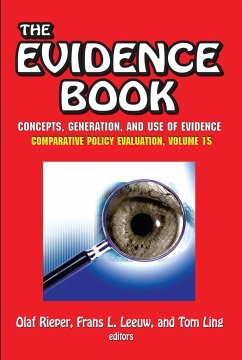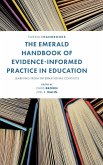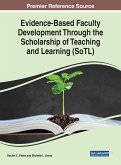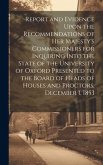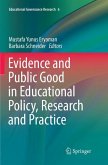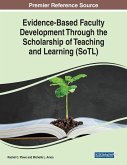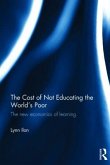Frans L. Leeuw
The Evidence Book
Frans L. Leeuw
The Evidence Book
- Gebundenes Buch
- Merkliste
- Auf die Merkliste
- Bewerten Bewerten
- Teilen
- Produkt teilen
- Produkterinnerung
- Produkterinnerung
Knowledge grows as ideas are tested against each other
Andere Kunden interessierten sich auch für
![The Emerald Handbook of Evidence-Informed Practice in Education The Emerald Handbook of Evidence-Informed Practice in Education]() The Emerald Handbook of Evidence-Informed Practice in Education187,99 €
The Emerald Handbook of Evidence-Informed Practice in Education187,99 €![Evidence-Based Faculty Development Through the Scholarship of Teaching and Learning (SoTL) Evidence-Based Faculty Development Through the Scholarship of Teaching and Learning (SoTL)]() Evidence-Based Faculty Development Through the Scholarship of Teaching and Learning (SoTL)228,99 €
Evidence-Based Faculty Development Through the Scholarship of Teaching and Learning (SoTL)228,99 €![Responsive Teaching Responsive Teaching]() Harry Fletcher-WoodResponsive Teaching176,99 €
Harry Fletcher-WoodResponsive Teaching176,99 €![Report and Evidence Upon the Recommendations of Her Majesty's Commissioners for Inquiring Into the State of the University of Oxford Presented to the Report and Evidence Upon the Recommendations of Her Majesty's Commissioners for Inquiring Into the State of the University of Oxford Presented to the]() AnonymousReport and Evidence Upon the Recommendations of Her Majesty's Commissioners for Inquiring Into the State of the University of Oxford Presented to the47,99 €
AnonymousReport and Evidence Upon the Recommendations of Her Majesty's Commissioners for Inquiring Into the State of the University of Oxford Presented to the47,99 €![Evidence and Public Good in Educational Policy, Research and Practice Evidence and Public Good in Educational Policy, Research and Practice]() Evidence and Public Good in Educational Policy, Research and Practice85,99 €
Evidence and Public Good in Educational Policy, Research and Practice85,99 €![Evidence-Based Faculty Development Through the Scholarship of Teaching and Learning (SoTL) Evidence-Based Faculty Development Through the Scholarship of Teaching and Learning (SoTL)]() Evidence-Based Faculty Development Through the Scholarship of Teaching and Learning (SoTL)174,99 €
Evidence-Based Faculty Development Through the Scholarship of Teaching and Learning (SoTL)174,99 €![The Cost of Not Educating the World's Poor The Cost of Not Educating the World's Poor]() Lynn IlonThe Cost of Not Educating the World's Poor231,99 €
Lynn IlonThe Cost of Not Educating the World's Poor231,99 €-
-
-
Knowledge grows as ideas are tested against each other
Hinweis: Dieser Artikel kann nur an eine deutsche Lieferadresse ausgeliefert werden.
Hinweis: Dieser Artikel kann nur an eine deutsche Lieferadresse ausgeliefert werden.
Produktdetails
- Produktdetails
- Verlag: Routledge
- Seitenzahl: 192
- Erscheinungstermin: 15. September 2009
- Englisch
- Abmessung: 235mm x 157mm x 15mm
- Gewicht: 437g
- ISBN-13: 9781412810234
- ISBN-10: 141281023X
- Artikelnr.: 25886521
- Herstellerkennzeichnung
- Libri GmbH
- Europaallee 1
- 36244 Bad Hersfeld
- gpsr@libri.de
- Verlag: Routledge
- Seitenzahl: 192
- Erscheinungstermin: 15. September 2009
- Englisch
- Abmessung: 235mm x 157mm x 15mm
- Gewicht: 437g
- ISBN-13: 9781412810234
- ISBN-10: 141281023X
- Artikelnr.: 25886521
- Herstellerkennzeichnung
- Libri GmbH
- Europaallee 1
- 36244 Bad Hersfeld
- gpsr@libri.de
Olaf Rieper has an M.A. in sociology and a Ph.D. from the Copenhagen Business School. He is Director of Research at the Danish Institute of Governmental Research (AKF). He has conducted evaluations and research on public programs for Danish and Norwegian government agencies and for the EU Commission. He has been visiting scholar at the School of Social Work, University of Michigan, and has worked at the Centre for European Evaluation Expertice (C3E) in Lyon. He has written books and guidelines on evaluation methodology and research methods and was the first elected chairman of the Danish Evaluation Society. Frans L. Leeuw is the Director of the Justice Research, Statistics and Information Center, affiliated to the Dutch Ministry of Justice and Professor of Law, Public Policy and Social Science Research at Maastricht University, the Netherlands. He is a sociologist (Ph.D, Leyden University, 1983). Earlier he was Professor of Evaluation Studies at Utrecht University, Director of the Performance Auditing and Evaluation Department of the Dutch National Audit Office, Dean of the Humanities and Social Sciences Faculty of the Netherlands Open University, Chief Inspector for Higher Education in the Netherlands and associate professor of policy studies at Leyden University. He has been one of the founding persons of the European Evaluation Society EES and past president of this organization. Currently he is President of the Dutch Evaluation Society. He is a Faculty member of the IPDET program. He has worked for the World Bank, the EU and for many agencies and ministries of the Dutch government. Tom Ling is Director for Evaluation and Audit at RAND Europe. He studied Social and Political Sciences at Cambridge University and completed a PhD in Government at Essex University. He joined RAND following four years as Senior Research Fellow at the National Audit Office in the UK. He has worked on evaluation projects with the European Commission, UK Government Departments, the National Audit Office, The Health Foundation and many others. He has published widely on evaluation, accountability and related topics. He is currently working on a Public Audit Handbook, a multi-site program evaluation of quality improvement in healthcare, and an analysis of the Impact Assessment process in the European Commission. He is Professor of Public Policy (Emeritus) at Anglia Ruskin University where he contributes to post[1]graduate teaching.
Preface 1. Introduction Part I: Concepts and History of the Evidence
Movement 2. On the Contemporary History of Experimental Evaluations and Its
Relevance for Policy Making 3. Institutionalization of Second-Order
Evidence-Producing Organizations Part II: Generating Evidence 4. What
Counts as "Sufficient Evidence" and a "Compelling Argument" in Evaluation?
5. Evaluative Evidence in Multi-Level Interventions: the Case of the Global
Environment Facility 6. "User-Dependent" Knowledge as Evidence in Health
Care Part III: Using Evidence 7. Results Management: Can Results Evidence
Gain a Foothold in the Public Sector? 8. Evidence and Politicians: Can the
Two Co-exist? 9. Conclusion and Perspectives: Risks and Promises of the
Evidence Movement
Movement 2. On the Contemporary History of Experimental Evaluations and Its
Relevance for Policy Making 3. Institutionalization of Second-Order
Evidence-Producing Organizations Part II: Generating Evidence 4. What
Counts as "Sufficient Evidence" and a "Compelling Argument" in Evaluation?
5. Evaluative Evidence in Multi-Level Interventions: the Case of the Global
Environment Facility 6. "User-Dependent" Knowledge as Evidence in Health
Care Part III: Using Evidence 7. Results Management: Can Results Evidence
Gain a Foothold in the Public Sector? 8. Evidence and Politicians: Can the
Two Co-exist? 9. Conclusion and Perspectives: Risks and Promises of the
Evidence Movement
Preface 1. Introduction Part I: Concepts and History of the Evidence
Movement 2. On the Contemporary History of Experimental Evaluations and Its
Relevance for Policy Making 3. Institutionalization of Second-Order
Evidence-Producing Organizations Part II: Generating Evidence 4. What
Counts as "Sufficient Evidence" and a "Compelling Argument" in Evaluation?
5. Evaluative Evidence in Multi-Level Interventions: the Case of the Global
Environment Facility 6. "User-Dependent" Knowledge as Evidence in Health
Care Part III: Using Evidence 7. Results Management: Can Results Evidence
Gain a Foothold in the Public Sector? 8. Evidence and Politicians: Can the
Two Co-exist? 9. Conclusion and Perspectives: Risks and Promises of the
Evidence Movement
Movement 2. On the Contemporary History of Experimental Evaluations and Its
Relevance for Policy Making 3. Institutionalization of Second-Order
Evidence-Producing Organizations Part II: Generating Evidence 4. What
Counts as "Sufficient Evidence" and a "Compelling Argument" in Evaluation?
5. Evaluative Evidence in Multi-Level Interventions: the Case of the Global
Environment Facility 6. "User-Dependent" Knowledge as Evidence in Health
Care Part III: Using Evidence 7. Results Management: Can Results Evidence
Gain a Foothold in the Public Sector? 8. Evidence and Politicians: Can the
Two Co-exist? 9. Conclusion and Perspectives: Risks and Promises of the
Evidence Movement

